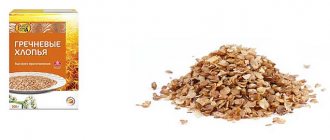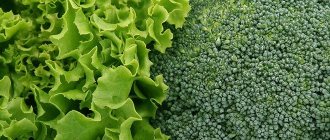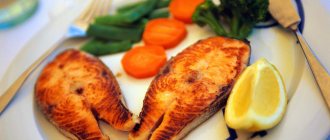Mackerel is a member of the mackerel family. This is a heat-loving, schooling fish that can reach a length of up to 60 centimeters. Mackerel has an elongated body, which is covered with small scales.
As a rule, mackerel gather in schools, and there are no fish of other species in schools. The optimal temperature for fish is from 8 to 20 degrees. During winter, the fish goes to a depth of up to 250 meters, where it leads a sedentary lifestyle, and in the spring it moves closer to the shores. The average lifespan of mackerel reaches 15-18 years.
Delicious mackerel dishes are often found on Russian tables. Both adults and children love her. But what is the nutritional value of mackerel and how high-calorie this fish is, you can find out from this article. And also below will be presented several delicious recipes for preparing this fish.
Chemical composition
The chemical composition of mackerel contains a huge amount of substances vital for the human body. The benefits of this fish are ensured by the fact that it contains the following elements:
- vitamins of group B, A, C;
- selenium;
- calcium;
- sodium;
- magnesium;
- fluorine;
- nickel;
- iodine;
- molybdenum;
- cobalt;
- phosphorus;
- iron;
- potassium;
- zinc;
- copper;
- manganese.
It is important to note that by consuming just 100 grams of this fish during the day, you can ensure that your body is full:
- selenium – 93.8% of the daily value;
- phosphorus – by 39.7% of the daily norm;
- vitamin B12 – 791.7% of the daily requirement.
The nutritional value of 100 grams of mackerel is:
- 18 grams of protein;
- 13.2 grams fat;
- 0 grams of carbohydrates;
- 0 grams of dietary fiber;
- 67.5 grams of water.
Useful properties and contraindications of mackerel
The rich chemical composition undoubtedly has a positive effect on the functioning of vital processes in the body, regardless of the calorie content of mackerel. However, there are some contraindications to its use, namely: individual intolerance and allergic reactions to fish, exacerbations of heart and gastrointestinal diseases. Smoked, salted and fried mackerel is not recommended for those who have chronic liver and kidney diseases, but it can be replaced with boiled fish in small quantities. But for everyone else, mackerel is still very healthy.
It is recommended for use by people of all age groups, especially children, adolescents and pregnant women. Thanks to phosphorus, mackerel strengthens the musculoskeletal system and normalizes fat metabolism, which means that eating boiled fish in small doses promotes weight loss, so the calorie content of mackerel will be beneficial.
In addition, this fish takes part in increasing the amount of hemoglobin, destroying plaques in blood vessels, strengthening the immune system and nervous system, and also regulates blood sugar levels, improves memory and vision. Eating boiled mackerel has a positive effect on the digestive tract, hair and skin structure, as well as on our mood. On top of that, it helps DNA synthesis, strengthens the spinal cord and mucous membranes of the entire body.
Calorie content of mackerel
Everyone knows that fish is a valuable source of protein and vitamins for the health, beauty and youth of our body. Mackerel is no exception - a fish of the Mackerel family from the order Perch. It not only has unique taste and low calorie content, but this fish is also very nutritious and healthy.
Mackerel always moves and lives in a school. It can be found in the warm waters of the Black and Marmara seas, as well as near the American coast. There are several subspecies of mackerel, which got their name in accordance with their habitat and fishing: Atlantic, Australian, African and Japanese.
This noble, hearty fish goes well with a wide variety of foods, so a huge number of tasty and healthy dishes are prepared from it. However, despite the optimal calorie content of mackerel, its meat is quite fatty, especially in individuals from northern latitudes. Representatives of these areas have higher calorie content than fish caught in southern latitudes, so how many calories are in mackerel is significantly influenced by where it was caught.
In cooking, this fish can be found both fried, baked, stuffed, and smoked, salted, boiled and steamed. Naturally, the calorie content of mackerel varies greatly. Oddly enough, smoked, fried and baked mackerel will have the highest calorie content, while boiled and steamed fish will have the least “weight”. This option will be the most beneficial for the body, especially since it will not harm the figure.
So how many calories are in mackerel prepared in the most common ways, what is its composition and nutritional value, and how is it useful?
How many calories are in mackerel and what is its composition?
Despite the low calorie content of mackerel, it is still necessary to pay attention to the method of its preparation. In this case, raw fish is used as a basis. The calorie content of raw mackerel is 153 kcal per 100 grams. As we have already found out, the calorie content of smoked mackerel is quite high, in addition, such fish will contain more fat than, for example, boiled fish. This is especially true for those that have been hot smoked. The calorie content of smoked mackerel prepared in this way is 221 kcal, and with cold smoking it is only 150 kcal. Hence the conclusion that an equally important parameter for determining the calorie content of mackerel is the method of smoking it. This fish is not recommended for consumption if you are on a diet or are obese.
The calorie content of fried mackerel is also high: it is approximately 176 kcal. Baked mackerel contains approximately the same number of calories - 178 kcal, but it is considered healthier because no vegetable fats are added during baking, i.e. it is cooked in its own fat. The calorie content of boiled and steamed mackerel is about 163-167 kcal, and in salted fish it is about 182-184 kcal. All values are given for a volume of 100 grams.
These caloric values are explained by the rich composition and nutritional value of mackerel. Fresh fish per 100 grams contains 18 grams of protein and 13.2 grams of fat, as well as 4.2 grams of saturated fatty acids and 67.5 grams of water. However, despite this, it contains a lot of vitamins and minerals, which makes mackerel extremely healthy. It contains almost all vitamins (from vitamin A to PP), and minerals are presented in the form of micro- and macroelements: iron, zinc, fluorine, phosphorus, potassium, sulfur, calcium and others.
Calorie content of mackerel in dietary nutrition
If you are on a diet or simply watch your figure and health, then you need to know that fish is indispensable for dietary nutrition, as it is a source of nutrients, vitamins and minerals. The average calorie content of mackerel allows you to consume it in moderation, even if you have problems with excess weight. In this case, the main role is played by the method of its preparation.
Nutritionists recommend consuming boiled, baked, convection-fried or steamed fish in small quantities, because it does not contain added fats other than its own. In addition to the optimal calorie content of mackerel, this fish retains more useful substances and contains a lot of valuable Omega-3 fatty acids.
When eating on a diet, you should not eat smoked or fried mackerel: it contains a lot of excess fat and harmful substances, which not only affect your figure, but also your overall health.
Useful properties and contraindications of mackerel
The rich chemical composition undoubtedly has a positive effect on the functioning of vital processes in the body, regardless of the calorie content of mackerel. However, there are some contraindications to its use, namely: individual intolerance and allergic reactions to fish, exacerbations of heart and gastrointestinal diseases. Smoked, salted and fried mackerel is not recommended for those who have chronic liver and kidney diseases, but it can be replaced with boiled fish in small quantities. But for everyone else, mackerel is still very healthy.
It is recommended for use by people of all age groups, especially children, adolescents and pregnant women. Thanks to phosphorus, mackerel strengthens the musculoskeletal system and normalizes fat metabolism, which means that eating boiled fish in small doses promotes weight loss, so the calorie content of mackerel will be beneficial.
In addition, this fish takes part in increasing the amount of hemoglobin, destroying plaques in blood vessels, strengthening the immune system and nervous system, and also regulates blood sugar levels, improves memory and vision. Eating boiled mackerel has a positive effect on the digestive tract, hair and skin structure, as well as on our mood. On top of that, it helps DNA synthesis, strengthens the spinal cord and mucous membranes of the entire body.
The best diets:
Calorie content of mackerel:
200 kcal.* * average value per 100 grams, depends on the method of preparation and type
Mackerel is a valuable commercial fish, distinguished by its pleasant taste and tender meat. It is affordable, nutritious and has a number of valuable properties.
Benefits of mackerel
This fish is enriched with Omega-3 acid, which can improve immunity and improve metabolism. Therefore, mackerel should be a mandatory product in the diet of children, people suffering from cardiovascular diseases, pregnant and lactating girls.
The protein contained in mackerel is absorbed three times faster than, for example, beef. It is also important that just 100 grams of mackerel contains half of the daily requirement for the average person.
When consuming mackerel, the level of oxygen in the cells increases, due to which all internal organs are enriched with it, and the fish also helps to launch regeneration processes in the mucous membranes and skin.
Fish oil allows you to dilate the blood vessels of the heart muscle, thereby reducing the risk of blood clots. With regular use, bones and teeth are strengthened and immunity is increased.
All the substances found in fish help ensure the normal functioning of cells, overcome harmful bacteria and establish the water-salt balance in the body. It is important that this fish does not need to be consumed in large quantities; you just need to introduce several servings of stewed or boiled mackerel into your weekly diet, and the benefits for the body will be noticeable after a few weeks.
Composition and calorie content of mackerel
Mackerel is a fairly fatty fish. There are about 13-30 g of fat per 100 g of product. Fish caught in winter in northern latitudes is especially fatty. Mackerel contains about 18 g of protein per 100 g of product. These proteins belong to the category of quickly digestible proteins and are absorbed by the body almost three times faster than beef meat.
Despite the high fat content, the calorie content of mackerel is quite low and is approximately 200 kcal. It turns out that in order to consume the daily calorie intake, a person will only need to eat 700 g of fish. However, doing this will be quite problematic, because it was already mentioned above that, despite its low calorie content, mackerel contains a lot of fat.
The undoubted advantage of mackerel is the unsaturated fatty acids it contains. They are a valuable product and act as antioxidants, that is, they help neutralize free radicals and strengthen cell membranes.
Radicals tend to break through cell membranes, thereby disrupting their vital functions, which often leads to the occurrence of various diseases, in particular cancer. Therefore, for the purpose of prevention, it is important for a person to consume valuable foods, including fish oil, rich in unsaturated fatty acids.
Also, the benefits of mackerel include a large number of different minerals. It contains zinc, fluorine, phosphorus, sodium, sulfur, manganese, potassium - and these are not all the useful substances that make up its meat. It also contains vitamins PP, A, C, B vitamins, which include vitamin B12, which takes part in fat metabolism, promotes DNA synthesis, and during hypoxia increases the level of oxygen consumption by cells.
Calorie content of fish
During the cooking process, the calorie content of the product depends on the type of heat treatment. The table below will show in detail what the calorie content of mackerel will be per 100 grams in boiled, fried, stewed and other types of preparation.
| Cooking method | Calorie content per 100 g (kcal) | Proteins (g) | Fat (g) | Carbohydrates (g) |
| Baked mackerel (no oil) | 181,0 | 18,7 | 11,9 | 0 |
| Baked mackerel in foil with tomatoes (no oil) | 167,0 | 17,0 | 10,8 | 0,4 |
| Fried mackerel (in oil) | 278,0 | 13,1 | 25,1 | 0 |
| Stewed mackerel in sour cream with onions and carrots | 139,0 | 11,2 | 10,0 | 1,2 |
| Cold smoked mackerel | 151,0 | 23,2 | 6,5 | 0 |
| Hot smoked mackerel | 248,6 | 21,0 | 17,8 | 1,5 |
| Boiled mackerel | 194,5 | 18,8 | 13,4 | 0 |
| Lightly salted mackerel | 196,4 | 21,2 | 13,3 | 0,1 |
| Dried mackerel | 152,8 | 25,2 | 4,5 | 0,9 |
| Grilled mackerel | 178,7 | 19,1 | 11,9 | 0,1 |
| Marinated mackerel | 135,3 | 11,9 | 8,5 | 3,5 |
Once you know the calorie content of mackerel per 100 grams, you can easily understand in what form this fish is most nutritious. From the presented data it is clear that hot smoked mackerel will have the most calories. But from eating this fish in stewed or pickled form, the body will receive fewer calories.
Having understood what nutritional value mackerel provides the body and what health benefits it can bring, you can begin to consider the simplest and most delicious recipes.
Calorie content Mackerel. Chemical composition and nutritional value.
Nutritional value and chemical composition of "Mackerel".
The table shows the nutritional content (calories, proteins, fats, carbohydrates, vitamins and minerals) per 100 grams of edible portion.
| Nutrient | Quantity | Norm** | % of the norm in 100 g | % of the norm in 100 kcal | 100% normal |
| Calorie content | 191 kcal | 1684 kcal | 11.3% | 5.9% | 882 g |
| Squirrels | 18 g | 76 g | 23.7% | 12.4% | 422 g |
| Fats | 13.2 g | 56 g | 23.6% | 12.4% | 424 g |
| Carbohydrates | 2.47 g | 219 g | 1.1% | 0.6% | 8866 g |
| Water | 67.5 g | 2273 g | 3% | 1.6% | 3367 g |
| Ash | 1.3 g | ~ | |||
| Vitamins | |||||
| Vitamin A, RE | 10 mcg | 900 mcg | 1.1% | 0.6% | 9000 g |
| Retinol | 0.01 mg | ~ | |||
| Vitamin B1, thiamine | 0.12 mg | 1.5 mg | 8% | 4.2% | 1250 g |
| Vitamin B2, riboflavin | 0.36 mg | 1.8 mg | 20% | 10.5% | 500 g |
| Vitamin B4, choline | 65 mg | 500 mg | 13% | 6.8% | 769 g |
| Vitamin B5, pantothenic | 0.85 mg | 5 mg | 17% | 8.9% | 588 g |
| Vitamin B6, pyridoxine | 0.8 mg | 2 mg | 40% | 20.9% | 250 g |
| Vitamin B9, folates | 9 mcg | 400 mcg | 2.3% | 1.2% | 4444 g |
| Vitamin B12, cobalamin | 12 mcg | 3 mcg | 400% | 209.4% | 25 g |
| Vitamin C, ascorbic acid | 1.2 mg | 90 mg | 1.3% | 0.7% | 7500 g |
| Vitamin D, calciferol | 16.1 mcg | 10 mcg | 161% | 84.3% | 62 g |
| Vitamin E, alpha tocopherol, TE | 1.6 mg | 15 mg | 10.7% | 5.6% | 938 g |
| Vitamin H, biotin | 0.18 mcg | 50 mcg | 0.4% | 0.2% | 27778 g |
| Vitamin K, phylloquinone | 5 mcg | 120 mcg | 4.2% | 2.2% | 2400 g |
| Vitamin RR, NE | 11.6 mg | 20 mg | 58% | 30.4% | 172 g |
| Niacin | 8.6 mg | ~ | |||
| Macronutrients | |||||
| Potassium, K | 280 mg | 2500 mg | 11.2% | 5.9% | 893 g |
| Calcium, Ca | 40 mg | 1000 mg | 4% | 2.1% | 2500 g |
| Magnesium, Mg | 50 mg | 400 mg | 12.5% | 6.5% | 800 g |
| Sodium, Na | 100 mg | 1300 mg | 7.7% | 4% | 1300 g |
| Sera, S | 180 mg | 1000 mg | 18% | 9.4% | 556 g |
| Phosphorus, P | 280 mg | 800 mg | 35% | 18.3% | 286 g |
| Chlorine, Cl | 170 mg | 2300 mg | 7.4% | 3.9% | 1353 g |
| Microelements | |||||
| Iron, Fe | 1.7 mg | 18 mg | 9.4% | 4.9% | 1059 g |
| Yod, I | 45 mcg | 150 mcg | 30% | 15.7% | 333 g |
| Cobalt, Co | 20 mcg | 10 mcg | 200% | 104.7% | 50 g |
| Manganese, Mn | 0.1 mg | 2 mg | 5% | 2.6% | 2000 g |
| Copper, Cu | 210 mcg | 1000 mcg | 21% | 11% | 476 g |
| Molybdenum, Mo | 4 mcg | 70 mcg | 5.7% | 3% | 1750 g |
| Nickel, Ni | 6 mcg | ~ | |||
| Selenium, Se | 44.1 mcg | 55 mcg | 80.2% | 42% | 125 g |
| Fluorine, F | 1400 mcg | 4000 mcg | 35% | 18.3% | 286 g |
| Chromium, Cr | 55 mcg | 50 mcg | 110% | 57.6% | 91 g |
| Zinc, Zn | 0.7 mg | 12 mg | 5.8% | 3% | 1714 g |
| Essential amino acids | |||||
| Arginine* | 1 g | ~ | |||
| Valin | 1 g | ~ | |||
| Histidine* | 0.8 g | ~ | |||
| Isoleucine | 1.1 g | ~ | |||
| Leucine | 1.6 g | ~ | |||
| Lysine | 1.5 g | ~ | |||
| Methionine | 0.6 g | ~ | |||
| Methionine + Cysteine | 0.8 g | ~ | |||
| Threonine | 0.8 g | ~ | |||
| Tryptophan | 0.18 g | ~ | |||
| Phenylalanine | 0.7 g | ~ | |||
| Phenylalanine+Tyrosine | 1.4 g | ~ | |||
| Nonessential amino acids | |||||
| Alanin | 1.4 g | ~ | |||
| Aspartic acid | 2 g | ~ | |||
| Glycine | 0.7 g | ~ | |||
| Glutamic acid | 2.6 g | ~ | |||
| Proline | 0.8 g | ~ | |||
| Serin | 0.9 g | ~ | |||
| Tyrosine | 0.7 g | ~ | |||
| Cysteine | 0.2 g | ~ | |||
| Sterols (sterols) | |||||
| Cholesterol | 70 mg | max 300 mg | |||
| Saturated fatty acids | |||||
| Saturated fatty acids | 4.2 g | max 18.7 g | |||
| 14:0 Miristinovaya | 1.43 g | ~ | |||
| 16:0 Palmitinaya | 2.42 g | ~ | |||
| 17:0 Margarine | 0.05 g | ~ | |||
| 18:0 Stearic | 0.3 g | ~ | |||
| Monounsaturated fatty acids | 4.48 g | min 16.8 g | 26.7% | 14% | |
| 16:1 Palmitoleic | 0.89 g | ~ | |||
| 18:1 Oleic (omega-9) | 1.61 g | ~ | |||
| 20:1 Gadoleic (omega-9) | 0.9 g | ~ | |||
| 22:1 Erucic (omega-9) | 1.08 g | ~ | |||
| Polyunsaturated fatty acids | 2.99 g | from 11.2 to 20.6 g | 26.7% | 14% | |
| 18:2 Linolevaya | 0.16 g | ~ | |||
| 18:3 Linolenic | 0.07 g | ~ | |||
| 18:4 Steoride Omega-3 | 0.27 g | ~ | |||
| 20:4 Arachidonic | 0.36 g | ~ | |||
| 20:5 Eicosapentaenoic acid (EPA), Omega-3 | 0.71 g | ~ | |||
| Omega-3 fatty acids | 2.47 g | from 0.9 to 3.7 g | 100% | 52.4% | |
| 22:5 Docosapentaenoic acid (DPA), Omega-3 | 0.1 g | ~ | |||
| 22:6 Docosahexaenoic acid (DHA), Omega-3 | 1.32 g | ~ | |||
| Omega-6 fatty acids | 0.52 g | from 4.7 to 16.8 g | 11.1% | 5.8% |
The energy value of Mackerel is 191 kcal.
Primary Source: Created in the application by the user. Read more.
** This table shows the average levels of vitamins and minerals for an adult. If you want to know the norms taking into account your gender, age and other factors, then use the “My Healthy Diet” application.
Fried mackerel in vegetable oil: a simple recipe
First you need to prepare the fish. Fresh mackerel should be cleaned and washed in water.
Next, the fish is cut into equal pieces and breaded in flour with the addition of a small amount of salt. Pour a little vegetable oil into a heated frying pan (you can use either sunflower or olive oil). Next, the fish is placed in a frying pan and fried on both sides. You can serve fried mackerel with any favorite side dish.
Stewed mackerel in sour cream: recipe
Using this recipe for stewed mackerel, quickly and deliciously cooked in the oven, you can feed your household. At the same time, this dish will not only help saturate the body and satisfy hunger, but will also bring benefits.
First you need to prepare the ingredients, namely:
- mackerel - 1 pc.;
- potatoes – 500 g;
- carrots – 100 g;
- onions – 2 pcs.;
- tomatoes – 2 pcs.;
- sour cream (15% fat) – 100 g;
- herbs, salt, vegetable oil, spices - to taste.
The mackerel is cleaned and cut into small pieces. Vegetables should also be peeled, washed thoroughly under water and cut. Next, you need to lay out the ingredients in layers in a fireproof form, greased with vegetable oil:
- 1st layer - potatoes;
- 2nd layer – fish;
- 3rd layer – onions and carrots;
- 4th layer – tomatoes;
- 5th layer – greens.
Each layer needs a little salt. Then add sour cream to the pan and place it in the oven for 30 minutes. Cooking mackerel in the oven is quick and tasty. The dish can be served without additional side dish.
Table
| element name | quantity | daily norm | |
| The nutritional value | |||
| Calorie content | 191 mg | ||
| Squirrels | 18 g | ||
| Carbohydrates | 0 | ||
| Fats | 13.2 g | ||
| Vitamins | |||
| Vitamin B3 | 8.6 mg | 15.059 mg | |
| Vitamin B2 | 0.36 mg | 1.329 mg | |
| Vitamin PP (NE) | 11.6 mg | 15.059 mg | |
| Vitamin B1 | 0.12 mg | 1.159 mg | |
| Vitamin E (TE) | 1.6 mg | 10.882 mg | |
| Vitamin C | 1.2 mg | 69.118 mg | |
| Provitamin A | 0 | 5 mg | |
| Vitamin A (VE) | 0.01 mg | 0.753 mg | |
| Vitamin B5 | 0.9 mg | 3.794 mg | |
| Vitamin B6 | 0.8 mg | 1.512 mg | |
| Vitamin B9 | 9 mcg | 285.9 mcg | |
| Vitamin H | 0.2 mcg | 33.8 mcg | |
| Vitamin A | 0.01 mg | 0.753 mg | |
| Vitamin E | 0 | 15 mg | |
| Vitamin B12 | 0.012 mg | 0.003 mg | |
| Vitamin B4 | 0 | 500 mg | |
| Vitamin D | 0.016 mg | 0.011 mg | |
| Vitamin K | 5 mcg | 85.4 mcg | |
| Macronutrients | |||
| Calcium | 40 mg | 987.5 mg | |
| Magnesium | 50 mg | 276.177 mg | |
| Sodium | 100 mg | 948.824 mg | |
| Potassium | 280 mg | 1807.143 mg | |
| Phosphorus | 280 mg | 852.941 mg | |
| Sulfur | 180 mg | 1000 mg | |
| Silicon | 0 | 30 mg | |
| Microelements | |||
| Iron | 1.7 mg | 13.75 mg | |
| Chlorine | 170 mg | 2300 mg | |
| Copper | 0.21 mg | 0.806 mg | |
| Manganese | 0.1 mg | 2 mg | |
| Fluorine | 1.4 mg | 3 mg | |
| Bor | 0 | 1.4 mg | |
| Aluminum | 0 | 40 mg | |
| Titanium | 0 | 0.85 mg | |
| Strontium | 0 | 1.5 mg | |
| Iodine | 0.045 mg | 0.131 mg | |
| Zinc | 0.7 mg | 9.706 mg | |
| Chromium | 0.055 mg | 0.034 mg | |
| Molybdenum | 4 mcg | 70 mcg | |
| Vanadium | 0 | 0.01 mg | |
| Cobalt | 0.02 mg | 0.1 mg | |
| Nickel | 6 mcg | 100 mcg | |
| Rubidium | 0 | 0.2 mg | |
| Lithium | 0 | 0.2 mg | |
| Selenium | 0 | 0.04 mg | |
| Tin | 0 | 0.7 mg | |
| Zirconium | 0 | 0.5 mg | |
| Other elements | |||
| Alimentary fiber | 0 | ||
| Organic acids | 0 | ||
| Water | 67.5 g | ||
| Mono- and disaccharides | 0 | ||
| Ash | 1.3 g | ||
| Alcohol | 0 | ||
| Starch | 0 | ||
| Saturated fatty acids | 4.2 g | ||
| Cholesterol | 70 mg | ||
| Unsaturated fatty acids | 0 | ||
This table shows the average norms of elements for an adult.
Cooking mackerel in a slow cooker: recipe
Having a multicooker makes preparing any dish much easier. In the case of this fish, you should first pour a little water into the bottom of the bowl. Next, you need to clean the fish, cut it and salt it. Cover a special container for steaming with food foil and place the mackerel in it. Next, put a little onion, cut into half rings, and a few slices of lemon on top of the fish.
Cook the fish in the “Steam” mode for 25-30 minutes. This fish will be useful for both children and adults.
Calorie content of mackerel
When creating a menu, it will be useful to know the nutritional value of fish.
Mackerel nutritional value table:
| cooking method | calorie content, kcal | proteins, g | fats, g | carbohydrates, g |
| fresh | 191 | 18 | 13,2 | |
| In oil | 278 | 13,1 | 25,1 | |
| for a couple | 191 | 18 | 13,2 | |
| salty | 305 | 18 | 13,1 | |
| boiled | 211 | 19,6 | 14,7 | |
| pickled | 142 | 12,8 | 8,3 | 3,7 |
| hot smoked | 317 | 22,1 | 23,8 | 4,1 |
| cold smoked | 150 | 23,4 | 6,4 |
Boiled and steamed mackerel contains the fewest calories, so during a diet it is recommended to give preference to these methods of preparing fish.
Harm to mackerel
For a healthy body, this fish cannot cause any harm. However, it should be remembered that if you have diseases such as kidney failure, hypertension, pancreatitis or cholecystitis, mackerel should not be consumed salted or smoked.
If you have problems with the gastrointestinal tract, you need to exclude this fish from your diet. In some cases, it is permissible to consume mackerel only in boiled form. However, it is worth remembering that high fat content can lead to unpleasant consequences. Therefore, you should discuss with your doctor the inclusion of this product in your diet.
Composition and benefits of mackerel
Mackerel belongs to the category of fatty fish, so it is unlikely to be recommended for dietary nutrition. However, the high fat content in fish makes it a rich source of unsaturated fatty acids, which are especially valuable for the human body. In addition, mackerel contains a large amount of protein, which is absorbed by the body 3 times faster than, for example, beef protein. Such valuable qualities must be taken into account by those who count how many calories are in mackerel.
Mackerel also contains many valuable vitamins and minerals. These are, first of all, B vitamins and vitamin PP. Vitamin B12 takes part in fat metabolism and DNA synthesis. Its intake into the body in sufficient quantities ensures that all cells of the body will receive oxygen in the proper amount. In addition to these valuable vitamins, fish also contains important microelements, such as manganese, sulfur, phosphorus, zinc, sodium, potassium, etc. Thanks to such a rich vitamin and mineral composition, fish is ideal for feeding people who need to increase and maintain balance of vitamins and minerals in the body. In particular, despite the calorie content of mackerel, it is especially recommended for pregnant and lactating women, adolescents, children and the elderly. In this case, the question of how many calories are in mackerel fades into the background and the benefits that this product can bring to the body are assessed first.








